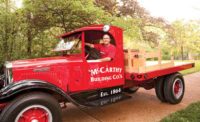 Tudor Hampton/ENR |
 Tudor Hampton/ENR HUSS exhibited diesel filter retrofits at Bauma (above). International has been showing off a new hybrid diesel utility truck (below).
|
When the Associated General Contractors of America held its annual conference in March in San Antonio, members who arrived early at the convention center may have noticed people cruising around the block in fuel-cell cars provided by the National Hydrogen Association, which also was meeting there.
So far, hydrogen may be too expensive and cumbersome to fly, but the future of internal combustion is no less a hot-button issue as concerns over greenhouse gas, energy security and fuel prices converge. Nothing engages the public more than spring fuel prices. Nationwide gas prices now are well over $3 per gallon, a 9% premium over last year. Meanwhile, diesel just went through a major round of desulfurization, boosting prices last year. But national costs now are stable, at $2.80. This time last year, average diesel prices were about 10 cents higher, according to the Dept. of Energy.
Diesel is inherently more powerful, efficient and economical than gasoline and has been the fuel of choice for construction since the early 1930s, when Caterpillar began switching over its tractor line from gas to diesel. Years later, it is being touted loudly as a better fuel for passenger cars and light trucks. A Caterpillar Inc. engine official who was recently asked what will be the future power source for heavy equipment likewise responded, “Diesel, diesel, diesel.”
Diesels may even put gas hybrids to shame. A new report by UBS Ltd. and U.K.-based Ricardo Co. says diesels “can deliver similar results at a lower cost.” The upfront cost of a diesel car or pickup is $2,000 to $4,000 versus a hybrid’s $5,000 to $8,000. And diesel—about 30% more efficient than gas and by 2010 just as clean—sips fuel on the highway; while hybrids gulps more. The report concludes that diesels will leave hybrids in the dust, with 1.5 million units on the road by 2012.
While hybrid powertrains could become a passing fad, married to diesel engines, they may be “the best of both worlds,” notes UBS. “The problem of course is cost….On the other hand, the fuel economy gains would be very large.”
That is what manufacturers are looking at. Earlier this year, International Truck and Engine Corp., said that it is producing hybrid utility trucks that get up to 60% better fuel mileage. And in April at the Bauma show in Munich, Volvo detailed its plan by 2009 to offer hybrids, starting with wheel loaders that burn 50% less fuel. Paccar, Komatsu and Case New Holland are testing hybrids, but CNH is pulling back for now due to high costs. Its excavator prototypes were “a technology exploration exercise,” says John Koszewnik, senior vice president of product development. Not including tax and fuel savings, retail costs today would be about double for diesel hybrids.
But diesels still are under fire in California. Regulators in July plan to restrict existing machines at a cost of $13 billion, AGC estimates. Retrofits costing $4,500 to $45,000 may help offset the replacement costs. Contractors are starting to look at installing tailpipe particulate traps, says Claus Holdschuh, CFO of retrofit supplier HUSS GmbH.
Nationwide, diesels may dodge the greenhouse-gas bullet. They emit less carbon dioxide than most cars, which will someday have to meet greenhouse regulations under April’s landmark Supreme Court ruling. Construction diesels make up less than 1% of the U.S. greenhouse inventory, a drop compared with automotive emissions. Rather than searching for a replacement to diesel, AGC says, the industry is focusing its “green” energy on cleaning up old machines, building better buildings and recycling more materials.
 Related Links:
Related Links: 

